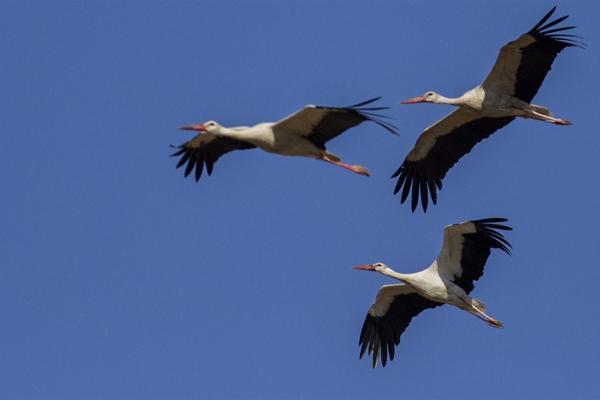Electricity company takes measures to save migrating storks
ISTANBUL/ANKARA – Demirören News Agency


Authorities in Istanbul are taking precautions to prevent migrating storks from getting electrocuted when they land on electric poles following their route, officials said on Aug. 24.
“We have allocated 1.9 million Turkish Liras [$258,000] from the budget to save the storks,” said Emrah Kalkan, the system director of BEDAŞ, the company serving electricity to the metropolis.
Some 12,000 pole devices that prevent storks from landing were set up and on some 5,800 poles bird saving kits were installed, added Kalkan.
“To stop the storks hitting or landing on these poles, additional works have been done in the districts of Silivri, Çatalca, Arnavutköy, Sarıyer and Eyüp,” stressed the director.
“Some storks in Germany fly to Africa via France, Spain and Gibraltar. But some fly to Turkey via the Balkans,” said Arzu Gürsoy Ergen, an academic from Ankara University, depicting the route of the storks.
“Storks fly over Anatolia to Nur Mountains and leave Turkey, then arrive at Lake Chad in Africa via the Valley of the Nile.”
According to a survey conducted in Germany, 1.8 million storks die each year as a result of being electrocuted and 7 percent of the stork population gets hurt after hitting the poles.
“Unfortunately, we don’t have any data on this in Turkey,” added Ergen.
The only data the officials have are those they obtain from the reasons behind power cuts.
“Some 70 percent of the electricity blackouts are due to storks that land or accidentally hit the poles,” said Murat Koşar, the regional director of BEDAŞ in Silivri district.
“We isolated the poles for the storks. Especially in the four neighborhoods in the region where the storks fly over mostly, we will make temporary power cuts so that even when they land, they won’t get electrocuted,” said Koşar.
Fikret Can, a lawyer, also known as “Stork Father” as he has been researching storks for 15 years, explained that around 50,000 storks fly over Istanbul during the migration period.
“Between Aug. 15-31, they fly over the city with large groups,” said Can, adding, “First you see the baby storks in the sky. The parents who get tired from feeding their babies leave our country later.”
Giving a detailed route map of the storks, Can called on the residents of the provinces of Kırklareli, Edirne, Tekirdağ, İstanbul, İzmit, Yalova, Bursa, Eskişehir, Konya, Karaman, Mersin, Adana and Hatay to look at the sky until the end of the month to watch the “beautiful migration.”
